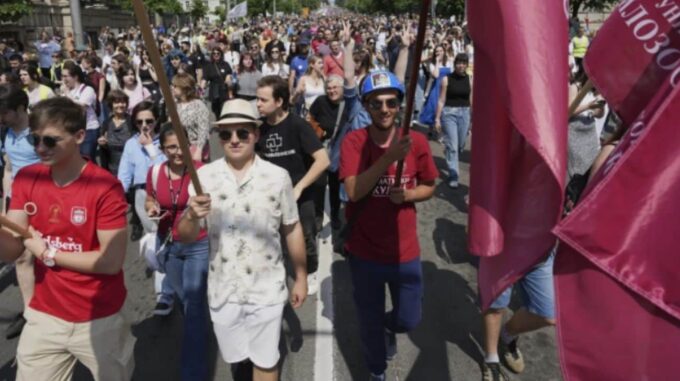Thousands of Serbs took to the streets to pay tribute to the victims of the tragedy at the railway station in Novi Sad

On Thursday, May 1st, the Serbian people once again gathered to honor those who perished in the collapse of a shelter at the railway station in Novi Sad — a tragedy that claimed 16 lives last year. This is a significant date — six months since the tragic incident, which shook not only the city but the entire country. People from different parts of the country assembled near the central station in Novi Sad to lay flowers and light candles in memory of the fallen. For several minutes, deep sorrow and silence reigned here, symbolizing mourning and respect. Afterwards, participants marched in a procession toward the city center, staging a peaceful rally with flags and posters bearing the words: "Novi Sad remembers." Meanwhile, in the capital city—Belgrade—trade unions and student organizations also joined protest actions. They are calling for substantial changes in labor legislation and laws on the right to strike, which are an integral part of their demands to the authorities during this particularly tense period. Students, the main force behind the protests that have been gaining momentum in recent months, are protesting against corruption and government dissatisfaction, especially regarding emergency situations on the railway. According to organizers, the Novi Sad tragedy is not just an accident but the result of systemic corruption and the negligent attitude of authorities towards safety. The lack of proper oversight and substandard repairs of the shelter led to its collapse during unfavorable weather conditions, resulting in the deaths of 16 people—primarily passengers waiting for their trains. Many believe this tragedy vividly demonstrates how corrupt schemes affect vital infrastructure objects. Furthermore, Serbian President Aleksandar Vučić, who only a few weeks ago tried to contain his emotions and did not publicly react to protest sentiments, is now facing increasing criticism. Opponents accuse the politician of deliberately ignoring issues faced by ordinary citizens and using force and repression to suppress mass protests. Vučić, in turn, assures that he seeks stability and calls for dialogue. A recent scandal further fuelled public tension when the president stated: "If it is proven that sound cannons or other prohibited weapons were used at the protests, I will resign." These words have raised even more questions and calls for transparency regarding the actions of law enforcement during the protests. Students and university professors remain some of the most active participants in this broad civil movement. They not only memorialized the victims at the station with symbols and events but also took on the role of catalysts for change. A memorial marker— a large stone inscribed with: "Novi Sad remembers"— appeared on the university campus in Novi Sad, symbolizing eternal remembrance and urging authorities to act more responsibly and transparently. The situation in the country remains tense. Under public pressure, authorities are trying to quell the protests, but public sentiment continues to grow. Mass demonstrations have rallied not only those seeking justice for the Novi Sad tragedy but also those demanding systemic change and increased oversight of corrupt schemes. Society is actively discussing the possible developments. Scientists and analysts predict an increasing likelihood of new mass protests if government institutions do not listen to the people's voice and fail to carry out necessary reforms. Meanwhile, it is expected that in the coming months, politics and civil society will remain in a tense struggle for justice and security in roads, railway stations, and other critical infrastructure objects. Experts note that these events are just part of a broader trend of dissatisfaction within Serbian society, which is seeking change and fighting corruption. At the same time, the political climate will remain tense, and the path toward real reform will be long and difficult, as the ongoing fight for honesty and transparency in the system faces many challenges ahead.

